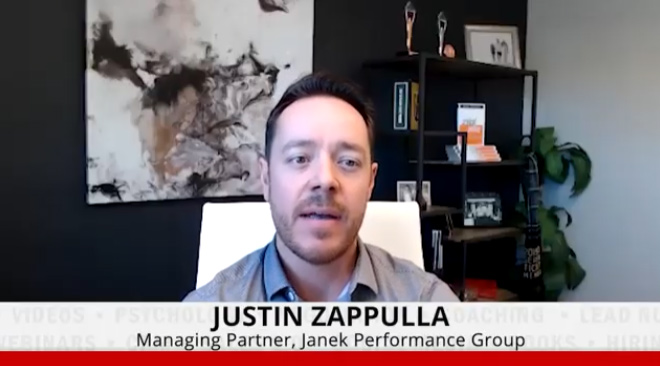The Science of Developing Sales Skills

Do you know the difference between an amateur and a professional? The amateur will practice until they get it right while the professional will practice until they can’t get it wrong. There are no secrets or shortcuts to becoming a high-performing sales professional. And, as a manager of salespeople, to create high-performing sales teams you need to establish clear sales competencies. Those competencies must be practiced and repeated until your team cannot get them wrong. If they fail to perform the fundamentals consistently, sales performance will suffer.
Sales is a science that follows the rules of cause and effect. At Janek Performance Group, we have dedicated ourselves to understanding the science of sales. If you fail to understand the science of sales, then you cannot improve sales. But if you have ever been a part of a highly trained team, either in sports or business, you understand the confidence that comes from that training. Nothing is left to chance, each step is drilled and practiced until it becomes subconscious.
Becoming a professional at selling does not require learning a million new sales techniques. It requires doing a handful of things exceptionally well. To become exceptional at anything requires repetition and practice. Unfortunately, the only time many salespeople practice is when they are with live prospects. This is not the best way to become exceptional at selling. Imagine you were on a football team and the only time you practiced was in real games. You would not expect to have a very good season.
In our flagship training program, Critical Selling® Skills, we break selling down into 5 core steps. They include:
- Opening
- Discovering
- Presenting
- Closing
- Handling Objections
This proven methodology is based on a foundation of stimulating interest, building trust, creating value, eliminating resistance and closing with confidence.
These high-level topics are not groundbreaking ideas and most sales professionals would agree they are important. But that’s one of the main problems. Many companies who don’t prioritize practice and training around these skills and expect this to be done by individual salespeople are making a costly mistake. In you do not have a process and system around training and practicing to the critical skills, results are unpredictable. Unpredictability is the enemy of high performance. It steals your focus, creates stress, and reduces engagement. Skills training and practice is the antidote to unpredictability.
While we all want sellers to spend their time selling, sometimes it can be easy to put off training or practice for more time selling. And while there certainly needs to be a balance, it reminds me of the story of two lumberjacks who are in the woods, cutting trees. One is working all day, non-stop. The other is continually stopping and taking breaks. At the end of the day, the lumberjack who took his breaks has twice as much wood cut. The first lumberjack is confused. “How did you do that, you were taking breaks all day.” The other lumberjack replies, “I wasn’t taking breaks, I was sharpening my saw.” This is the good analogy as to why sales professionals must continually sharpen their skills if they want to be more productive.
The Ebbinghouse Curve and Knowledge Retention
Are you familiar with the Ebbinghaus Forgetting Curve principle? It was hypothesized by Hermann Ebbinghaus in 1885, and states that we forget 40% of new information within the first 24 hours of learning it – a key factor in why on-going sales training reinforcement is important. Learning new sales skills requires a period of follow-up reinforcement. A common misconception with sales training is that it is often a one-time event without further reinforcement.
Michelangelo said, “If people knew how hard I worked to get my mastery, it wouldn’t seem so wonderful at all.” What he meant by that is if people saw how much work he puts in, they might understand his talent is the product of hard work instead of innate gifts. As in selling, people are not born with all the natural sales skills. They are learned, practiced, and improved over time with deliberate practice. The most effective salespeople continue to study, practice, and work on their craft on-going. Despite the fact that others may call it luck, high-performing sales professionals know, the harder I work, the luckier I get. It has nothing to do with luck at all. It is an expected outcome from hard-work and dedication.
The more sales reps practice, the greater the growth in confidence. The greater the growth in confidence, the higher the growth in performance. Sales skill mastery is about identifying areas of weakness and practicing those areas until you see verifiable evidence of improvement. Too often salespeople focus on the outcome. They measure their success by how many opportunities they close. But if they ignore the skills they need to master in order to get the outcomes they desire, their performance will still suffer.
Sales training, skill development, and confidence are all linked. Sales professionals dine on a daily diet of rejection, refusals, and dismissals. Because of this, complacency is the enemy of every sales professional. Zig Zigler once said, “People often say motivation doesn’t last. Neither does bathing — that’s why we recommend it daily.” Ongoing skill development, coaching, role-playing, and accountability are all necessary, not optional, to become a high sales performer. It does not matter if you are selling manhole covers or self-driving cars — without skills development, you are like the lumberjack that never sharpened his saw.

- Account Planning (16)
- Awards (42)
- Client Testimonial (37)
- Personal Branding (21)
- Podcast (12)
- Research (77)
- Sales Career Development (90)
- Sales Coaching (164)
- Sales Consulting (141)
- Sales Culture (181)
- Sales Enablement (380)
- Sales Leadership (111)
- Sales Management (267)
- Sales Negotiation (11)
- Sales Prospecting (136)
- Sales Role-Playing (19)
- Sales Training (242)
- Selling Strategies (279)
- Soft Skills (78)
- Talent Management (101)
- Trusted Advisor (29)
- Virtual Selling (57)
- Webinar (13)




























